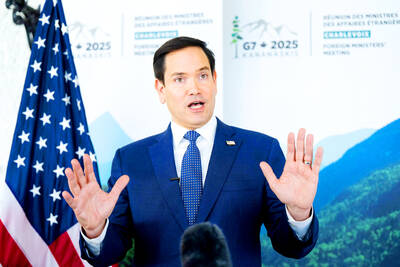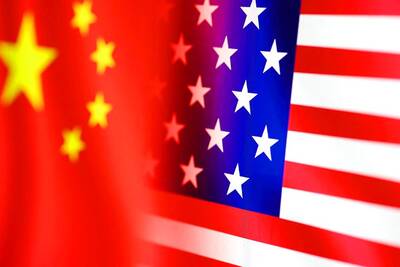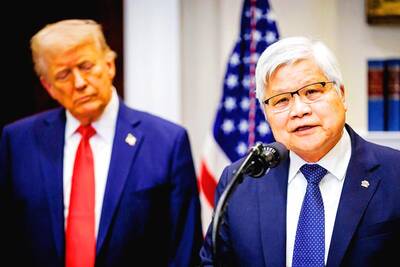Taiwan has received a letter from the WHO inviting it to attend as an observer at this year’s World Health Assembly (WHA) meeting next month under the name “Chinese Taipei,” Department of Health (DOH) Minister Yeh Ching-chuan (葉金川) said yesterday.
“I wish to invite the Department of Health, Chinese Taipei, to attend the 62nd World Health Assembly as an observer. The Assembly will be convened at 10:00 on Monday, 18 May, 2009, in the Palais des Nations, Geneva, Switzerland,” the letter from WHO Director-General Margaret Chan (陳馮富珍) to Yeh reads. “I would appreciate if you could confirm the attendance of the Department of Health, Chinese Taipei, and the names of the attendees at your earliest convenience.”
Taiwan’s presence at this annual meeting of the decision-making arm of the WHO would mark the first time the country has been allowed to participate in a meeting or activity of a specialized UN agency since losing its UN membership to China in 1971. Taiwan launched a campaign to participate in the WHO in 1997, but to no avail amid opposition from China.
After consulting President Ma Ying-jeou (馬英九), Yeh accepted the invitation yesterday after receiving it by fax at 9pm on Tuesday.
“The [original] letter is still on its way,” Yeh told a press conference at the Government Information Office.
The minister said the public should note key words in the letter, such as the reference to “Chinese Taipei” and the recipient being referred to as a “minister.”
Yeh said the acceptance of Taiwan under the name “Chinese Taipei” was a “breakthrough.”
Participating in the WHA meeting as an observer means Taiwan would have no voting rights in the assembly or at the WHO. Observers are granted speaking rights at the WHA meeting, but can only attend the meetings and committee sessions held during the annual two-week assembly.
Yeh said that WHA observer status would ensure Taiwan has direct contact with the WHO in exchanging information to protect public safety and would enable Taiwan to share its expertise in public sanitation and disease prevention with other countries.
Yeh said Taiwan’s representative office in Geneva would liaise with the WHO secretariat to iron out the details of Taiwan’s participation in the WHA meeting, including Taiwanese reporters’ coverage of the event. In past years, the UN Office in Geneva rejected applications from Taiwanese journalists for press credentials to cover WHA meetings because Taiwan is not a member of the WHO.
The officials at yesterday’s press conference declined to say what had transpired between Chinese and Taiwanese negotiators that led to Taiwan being granted WHA observer status.
“Health officials on both sides exchanges ideas on the matter technically, but we will not reveal the process ... in conformance with international practices,” Vice Minister of Foreign Affairs Andrew Hsia (夏立言) said.
Taiwan would enjoy the same rights as the six other observers scheduled to attend the WHA meeting, he said.
At a separate setting yesterday, Ma attributed the breakthrough to his cross-strait policy and Beijing’s goodwill.
Ma said three factors had contributed to the invitation: the joint efforts of the public and all political parties; the support of the international community, including Taiwan’s diplomatic allies and non-allied countries; and the goodwill of the “mainland authorities.”
Addressing a high-level meeting at the Presidential Office yesterday morning, Ma said the invitation had a lot to do with his administration’s effort to improve cross-strait relations and push the diplomatic policy of “modus vivendi.”
Cross-strait rapprochement had received international recognition and cultivated trust among Taiwan’s diplomatic allies, he said.
“Over the past few months, the government has been pushing the matter in a low-profile fashion to avoid any misunderstandings or difficulties,” he said.
Saying he was gratified at this year’s result, Ma added that he would offer a clearer account of the matter and outline future policy today.
Asked for comment, Chinese Nationalist Party (KMT) Legislator Chang Hsien-yao (張顯耀) said the development could be interpreted as a goodwill gesture from China.
“Although there is still a long way to go before we can gain full membership of the organization, this is a breakthrough and a sign of progress,” he said.
Democratic Progressive Party (DPP) Legislator William Lai (賴清德) said the government should publicize the process of Taiwan’s participation in the WHA, and tell the public the truth about whether any secret negotiations had been involved in gaining China’s approval.
He said the DPP suspected the KMT and the Chinese Communist Party had reached an agreement that Taiwan would consult with China and not with the international community on the WHA bid, that Taiwan would not challenge the “one China” framework and that the WHA would review Taiwan’s observer status annually under the title “Chinese Taipei.”
“We need to observe whether Taiwan will gain substantial benefits through participating in this year’s WHA, such as receiving the latest information on health matters and epidemic control measures to combat swine flu,” DPP Legislator Huang Wei-cher (黃偉哲) said.
At another meeting with reporters later yesterday, Hsia was adamant that “no secret deals” had been made between Taiwan and China and that Taiwan’s observer status came “without condition.”
The designation of “Chinese Taipei” has always been an acceptable option, even though “Republic of China” would be much preferred, he said.
Nonetheless, the name “Chinese Taipei” was not derogatory because Taiwan has used the title in other international organizations, Hsia said.
The Taiwanese delegation Yeh plans to lead to the WHA meeting will include 11 health officials and three experts attending in a non-official capacity, Chen Chien-jen (陳建仁) and Chen Pei-jer (陳培哲), both distinguished research fellows at the Genomic Research Center of Academia Sinica, and Chang Shen-chwen (張上淳), vice superintendent of National Taiwan University Hospital.
ADDITIONAL REPORTING BY FLORA WANG, RICH CHANG AND CNA

Taiwan’s Lee Chia-hao (李佳豪) on Sunday won a silver medal at the All England Open Badminton Championships in Birmingham, England, a career best. Lee, 25, took silver in the final of the men’s singles against world No. 1 Shi Yuqi (石宇奇) of China, who won 21-17, 21-19 in a tough match that lasted 51 minutes. After the match, the Taiwanese player, who ranks No. 22 in the world, said it felt unreal to be challenging an opponent of Shi’s caliber. “I had to be in peak form, and constantly switch my rhythm and tactics in order to score points effectively,” he said. Lee got

‘CROWN JEWEL’: Washington ‘can delay and deter’ Chinese President Xi Jinping’s plans for Taiwan, but it is ‘a very delicate situation there,’ the secretary of state said US President Donald Trump is opposed to any change to Taiwan’s “status quo” by force or extortion and would maintain that policy, US Secretary of State Marco Rubio told the Hugh Hewitt Show host on Wednesday. The US’ policy is to maintain Taiwan’s “status quo” and to oppose any changes in the situation by force or extortion, Rubio said. Hewitt asked Rubio about the significance of Trump earlier this month speaking with Taiwan Semiconductor Manufacturing Co (台積電) chairman C.C. Wei (魏哲家) at the White House, a meeting that Hewitt described as a “big deal.” Asked whether the meeting was an indication of the

‘RELATIVELY STRONG LANGUAGE’: An expert said the state department has not softened its language on China and was ‘probably a little more Taiwan supportive’ China’s latest drills near Taiwan on Monday were “brazen and irresponsible threats,” a US Department of State spokesperson said on Tuesday, while reiterating Washington’s decades-long support of Taipei. “China cannot credibly claim to be a ‘force for stability in a turbulent world’ while issuing brazen and irresponsible threats toward Taiwan,” the unnamed spokesperson said in an e-mailed response to media queries. Washington’s enduring commitment to Taiwan will continue as it has for 45 years and the US “will continue to support Taiwan in the face of China’s military, economic, informational and diplomatic pressure campaign,” the e-mail said. “Alongside our international partners, we firmly

KAOHSIUNG CEREMONY: The contract chipmaker is planning to build 5 fabs in the southern city to gradually expand its 2-nanometer chip capacity Taiwan Semiconductor Manufacturing Co (TSMC, 台積電), the world’s biggest contract chipmaker, yesterday confirmed that it plans to hold a ceremony on March 31 to unveil a capacity expansion plan for its most advanced 2-nanometer chips in Kaohsiung, demonstrating its commitment to further investment at home. The ceremony is to be hosted by TSMC cochief operating officer Y.P. Chyn (秦永沛). It did not disclose whether Premier Cho Jung-tai (卓榮泰) and high-ranking government officials would attend the ceremony. More details are to be released next week, it said. The chipmaker’s latest move came after its announcement earlier this month of an additional US$100 billion